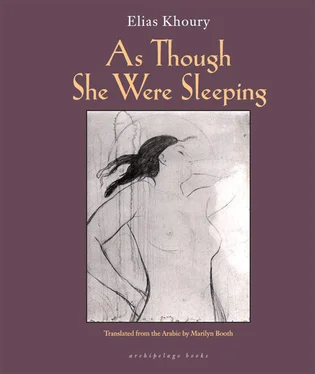The story goes that Maryam died suddenly, the heirs of Khawaja Efthymios put the house up for sale, and in the end they settled on Salim Shahin, who bought the house for cash. It was perhaps as much as a year after her move to the new house that Hasiba became aware of the double life her husband had been living. But the only tactic she had at her disposal was to blend her scream with the gas she needed to burn her body after that dog son of a bitch had burned her heart . And then she submitted herself to God. To her passion for walking alone at night she added a passion for cats. The garden rapidly became a refuge for stray cats from all over town. From among them she would choose her favorite, bringing it into the house and insisting that her son and husband treat it exactly like a member of the family.
The pain thrashed Milia in her lower belly until she could barely suppress her screams. She cried out Mansour’s name. She knew he was not at home but there was no one else to whom she could resort. It was at this moment that she heard her grandmother’s voice, a voice she had not heard before; and here was the cat, and then suddenly she saw her grandfather Salim standing in the garden and tossing a pebble upward toward the window to tell his Egyptian lover that he was here. He would crouch beneath the eucalyptus, waiting for the woman to appear, her shadow already etched behind the window, half hidden by the thick interlacing of jasmine tree leaves. She could see it all and, seeing it, she was mortally afraid. No, this was not a dream. That cat was a dream — the cat that had nipped at her feet and whose meowing had lacerated her heart. All the rest consisted of circles rippling out from the dream, spherical waves of memories, images of all of the deceased who visited Milia in her dreams. She seemed always to be witnessing a story that was not hers, as if she was reading a book or as if the lid on the ancient chest her grandmother had given her was opening and instead of removing books and papers and letters of the alphabet she was taking out a man and a woman and their only son. In the distance stood the mistress, the lover waiting under the window while Khawaja Sergios Efthymios stood motionless in a corner, in his red tarbush and his carefully pressed European suit, the rasp of his coughing unmistakable.
Milia knows that Mansour is not here. For three months now he has been disappearing for days at a time and when he returns, his face is governed by a sadness that shows especially mournfully in his eyes.
Where has the poetry gone? she asks him.
She knows well that poetry’s greatest enemy is death. Poetry cannot conquer death, contrary to what Mansour would argue. Poetry’s greatest function is to help us accept death, and to make our peace with it, to the point perhaps where we are able to believe it has been victorious over death when in truth poetry is the mere progeny of death: its secret voice.
When Mansour’s brother, Amin, died, the world was turned upside down. Though she would never have believed it could happen, immediately Milia saw another man born inside of her husband. The man she knew — and about whom she knew everything, she was certain — simply had disappeared. That open book she had known so well was no longer. As the childbirth pangs squeezed her and wrung her out, now, she would say that, yes, she had loved him, on that night when they had finally reached the hotel. She had fallen in love with the man who entered her sleep and her wakefulness, who could fill up her silence with words and who awed and bewildered her with the poetry he declaimed. He was a man whose love of life — and the particular route it had taken — revealed itself in his insatiable adoration of the food his wife prepared and the myriad of excuses he found, a new one every day, to drink arak. Good food demands arak. Haraam! that a man would eat this stunningly delicious food without drinking arak! he would exclaim. He would plunge into Milia’s various ragouts and float on the bliss of her laban immuh , then laugh and say that the ancient Arabs composed odes on sweets. He would remember Ibn el-Rumi and his relationship with that sweet of sweets, zalabiya . Sweet pastries are gold, woman, he’d declare. Listen!
The dough flows swift and silvery
off graceful fingertips
and puffs and swells all buttery
into latticework of gold
But no one ever wrote in praise of stews and other ordinary dishes, alas! And then, what about this food to end all foods, laban immuh with rice?
That is not its true name, interjected Milia. Yes, Beirut folks call it that, but it is from Syria and there it is called shakiriyya .
It doesn’t matter! What does matter is — God forgive us — its very name is a bit of a fierce warning. Listen to what’s written in the Torah: Do not eat the calf in its own mother’s milk. Our cousins the Jews do not eat meat cooked in butter, and that’s why.
They’re right, said Milia, and she announced then and there that she would stop cooking calf in its own mother’s milk. Because it’s a savage thing to do, she said.
Not savage, not silly! This laban immuh is the mother of all foods and we will all be cooking it come Judgment Day!
He sipped his arak and then took a taste of laban , and enjoyed saying that no one had ever quite approached it like this before. Milk and milk; lion’s milk (arak’s other name, Mansour told her) and cow’s milk. We’re mixing milk and milk. A man can be a child nursing at the breasts of heaven.
Such a moment would spur Mansour to begin reciting poetry. From where had his memory gathered in so many stored-up poetic treasures that his stock never seemed to run dry? Where did it all come from, this daily infusion of a new fund of poetry to add to his never-ending verbal effervescence? She loved him. She had fallen in love with his words and with his love for her. She began to grow accustomed to the triadic life she lived here in Nazareth: the house, the street, and her dreams in her sleep. Then came the news that shook her life to the core and forced her into a relationship with a completely different person. She had to make an entirely new attempt to love him, at a time when she was no longer prepared for such a trial.
Her husband suggested she go to Beirut to have her mother at her bedside for the birth. Even before hearing his wife’s thoughts on the matter, though, he withdrew the idea. Everything is ransomed to its own time, he said, and the security situation is very unsettled. He did not want to expose her life or that of the baby to danger and so he proposed instead that she invite her mother to come to Nazareth. But Milia rejected both suggestions. She would not go to Beirut because she had come to Nazareth to give birth here, and she would not summon her mother for the mother was chronically ill. Such a visit would impose an added burden on Milia, who would have to take care of her.
From the start — that is, ever since the girl’s memory had taken form — she had seen herself as a mother to her own mother and had thought of herself as an orphan. No indeed, she did not want Beirut and she did not want her mother. She wanted to have the baby here because that was what the child wanted. All she wanted from the world now was fulfillment of a single and singular desire: to meet this child whom she saw in her dreams, his immense eyes open so wide that they seemed to have no eyelashes, staring at her from within the waters in which he floated, and telling her the story that no one had ever heard.
Then that news came and everything changed. She recognized finally and fully that if Mansour had once fled from his brother to her, now Amin had succeeded in regaining his brother, and she had no power to change any of it. In the end, there was no choice but to go to Jaffa.
Читать дальше












